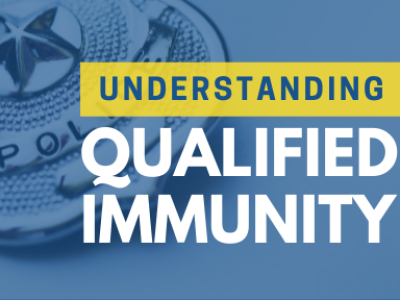
By Jessie Baker
President, VLCT Board of Directors
February 22, 2022. The Vermont Senate is considering multiple bills to create a new and expansive private cause of action for monetary damages against Vermont law enforcement personnel and remove qualified immunity as a defense. These actions threaten to divert resources from the state’s critical, successful, and ongoing police reform efforts, decimate our police departments’ ability to hire and recruit, and do nothing to improve how Vermont’s municipalities train and deploy more than 550 police officers.
Proponents have been touting survey results that claim a majority of Vermonters support ending qualified immunity. But what is qualified immunity? It is one of several different types of immunity federal and state courts have recognized for the State, municipalities, and their public officials and employees. Sovereign immunity protects the State. Municipal immunity protects our towns and cities. Official immunity protects the state’s highest executive officers, including judges and legislators. Qualified immunity protects, as the courts have put it, “… lower-level officers, employees and agents.”
Over decades of case law, the Vermont Supreme Court has explained that the purpose of qualified immunity is to protect officials from liability that could hamper their ability to do their jobs and subject their game-time decisions to a judicial system “ill-suited” to make such second guesses. Courts have extended qualified immunity only to those individuals acting within the scope of their authority, acting in good faith, and performing “…discretionary, as opposed to ministerial acts.” The courts have further established objective standards to determine the “good faith” test.
Proponents of the bills to eliminate qualified immunity claim that the established law makes it impossible to hold law enforcement responsible. However, VLCT – which operates a municipal property and casualty fund that insures most of Vermont’s municipalities and their law enforcement organizations – has paid out more than $1.7 million in law enforcement-related damages and settlements since 2016. And the Vermont Supreme Court has ruled that Vermonters can seek and collect monetary damages from law enforcement officers through private rights of action when an officer violates clearly established law or has acted in bad faith.
Making it easier to sue a law enforcement agency or officer will not increase accountability. Unlike revenge, discipline is a dish best served warm. Officer discipline should normally occur within days, weeks, or months of a violation. Lawsuits take years to resolve. Officer discipline is, and should remain, the primary responsibility of the chief of police, who reports to and is accountable to residents such as a town or city manager, selectboard, or city council. Vermont’s Act 56 provides a far superior pathway to professional regulation and offers a parallel path to officer accountability. The bills before the legislature will increase the amount of law enforcement-related litigation, but won’t result in greater accountability or reform. They instead give attorneys a source of more legal fees and make more police officers subject to more lawsuits.
Making officers the subject of more litigation that constantly second-guesses their game-time decisions may drive many of them out of the ranks at a time when law enforcement agencies are struggling with recruitment and retention. A March 2021 Vermont Association of Chiefs of Police survey of Vermont municipal police officers revealed that out of 330 officers, 85 percent said they’d be reluctant to perform their duties if qualified immunity was eliminated. Nearly 50 percent of the officers surveyed said they’d either leave their jobs immediately, within a year, or as soon as they found another job.
For the officers that remain, the bills before the legislature – if passed – will make police reform more difficult. Defending more lawsuits, settling more claims, and sorting through the additional litigation will siphon taxpayer dollars away from police reform efforts. Vermont is leaps and bounds ahead of many other states’ cities and towns in its efforts to create and implement meaningful police reform. The newly-enacted Act 56 process holds officers directly accountable for their actions. An officer could see their certification suspended or revoked and could be prohibited from working in the profession in Vermont.
Instead of asking municipalities – and their residents – to pay to defend more lawsuits against officers, we should put our resources towards the important work of changing the way we police. Presently, police officers are often the only available resource to send when there is a 911 call related to a person in distress. Rather than sending police, there are times where specialized, non-police mobile crisis response staffed by people with lived experience of mental health challenges, mental health clinicians, and a nurse or EMT would be preferable. Municipalities need the funding to undertake these initiatives.
VLCT fully supports a laser-like focus on police reform. In August of 2020, we issued a policy entitled Perspectives on Police Reform that features a holistic approach to improving law enforcement performance and accountability. It includes provisions to improve officer accountability, while preserving qualified immunity. Today, VLCT also issued a policy brief on qualified immunity authored by VLCT Property and Casualty Intermunicipal Fund General Counsel Phil Woodward.
As the legislature considers how to make more inroads on law enforcement reform, I hope they’ll listen to a wide variety of Vermonters on the subject of qualified immunity. Making law enforcement less prepared to do their job won’t solve our nation’s policing enigma or build trust in community. It’s more likely to create frivolous law suits, reduce the number of police serving, siphon valuable reform resources away from municipalities, and cost the taxpayer money. Let’s work together to find real solutions that make our police more accountable when they make mistakes, tackle concerns about the role that race plays in police work, and build systems that respect the dignity and value of every individual.